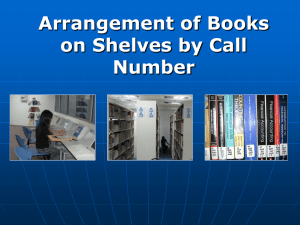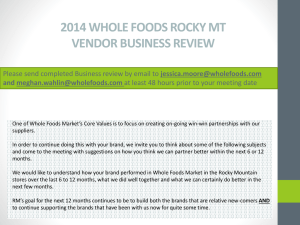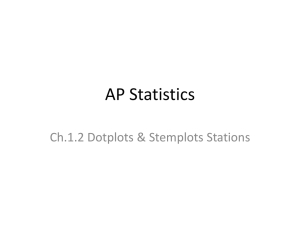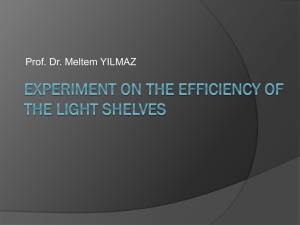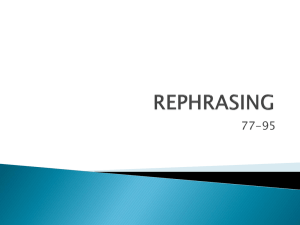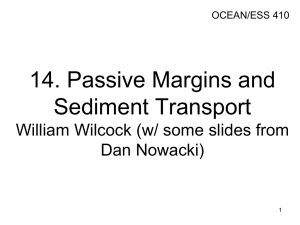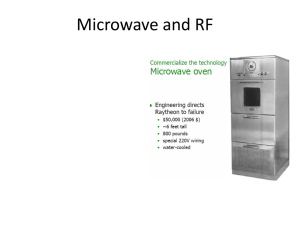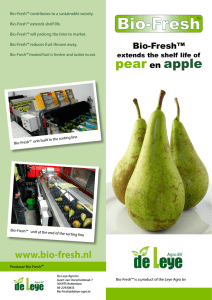Research in the Shelf Space and Boyond
advertisement
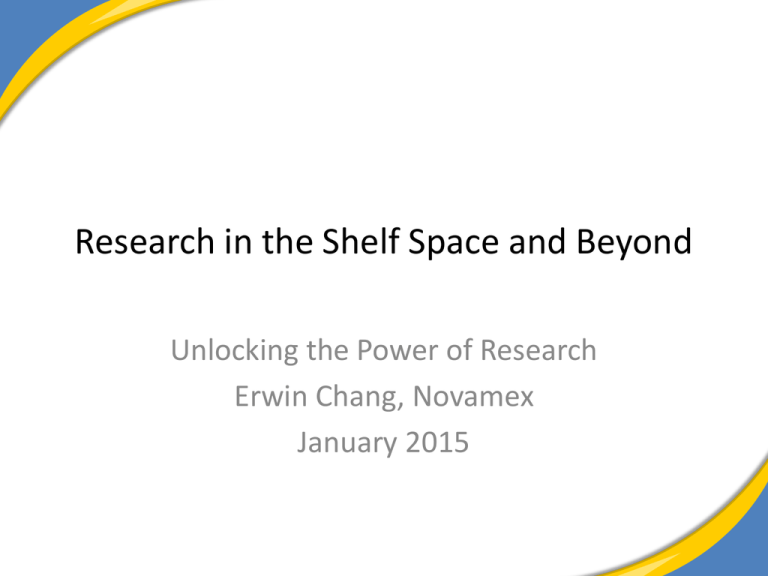
Research in the Shelf Space and Beyond Unlocking the Power of Research Erwin Chang, Novamex January 2015 Introduction • This presentation will explain various types of instore research (not only shelf space research) that are currently in use at Novamex and can be useful for various CPG studies • Some of the techniques were custom-designed to be conducted in the Hispanic market, but can be adapted to the general market 2 Agenda • Shelf Test • Beyond Shelf, Quant • Beyond Shelf, Qual 3 SHELF RESEARCH 4 Shelf Tests Novamex Goals: • What package to use within the shelf • What changes to make to packages to improve visibility, impact, recognition, desirability and purchase • Where to place the product 5 Shelf Test Quant Currently two-three shelf tests are being used by most CPG companies: • Online tests • Physical shelf tests – CLT • At stores: test markets, etc. Pros Cons Online Cheap, fast, different tasks Representation (Hispanic market) CLT Closer to real world, use of eye tracker Expensive, lengthy At Stores Better representation Very expensive, too late 6 Research in the Hispanic Market Some key insights: • Although improving, internet penetration is not extensive among first generation Hispanics (63%, Pew Hispanic Center, 2012) • Moreover, many of them are also afraid of using a computer • Many of their purchases are made by “team” decisions as various family members are involved • Children have a strong influence in the purchase of many products 7 Shelf Test Solution – Quant $0.99 0.99 $1.19 $1.10 $0.99 0.99 $1.19 $1.10 $0.99 0.99 $1.19 $1.10 • A virtual shelf made of real-size printouts is shown on a large board • Easy to configure product positioning on the board shelves and change prices in seconds • Affordable, easy to deploy, more representative and reliable 8 Shelf Research, Qual Objectives: • Understand the relationship between brands that share the same shelf • Understand the relationship between advertising and our product on the shelf Process: • As a follow-up to the quantitative shelf test, IDI’s are conducted • Sometimes extra information is given to participants to learn if they may change their minds if other variables change • The extra information may include advertising pieces that can be shown prior to the shelf test or after, depending on the research design 9 ITEM PLACEMENT 10 Shelf vs. Item Placement Research Shelf Research Includes: • Shelf (In-Store) Item Placement Research Includes: • Shelf • Refrigerated shelf • Endcaps • Displays • Side stacks • Pallets • Cash register displays Floor Activity 11 Floor Activity Key characteristics about floor activity: • Different from placing the items within the shelf, products on pallets, stacks or displays do not share space with other brands • Increase visibility in a natural way • There are extra costs associated with the use of floor activity • Promotions and sales are also associated to the use of floor activity 12 Item Placement Research Key questions: • What would we want to know about the use of floor activity? – – – – Does it work? Is it worth the extra costs? Which type of floor activity should we use? Are all types of floor activity the same? • How to answer these questions? – Next slides 13 Item Placement Quant Does floor activity work? Is it worth it?... Process • We obtain information about weekly sales and floor activity (pallets, side stacks, displays, etc.) • Using multivariate analysis, the relationship between sales and the use of different places to exhibit products is found Data Collection: • Information provided by the store, plus • Information collected by a store-check team 14 Store-Check Team • All audits are conducted weekly from Wednesday to Friday, as prices and floor activity changes on Wednesdays at main grocery stores • Team uses an online survey to conduct the audits on handhelds • They check each store for: – Product availability – Product placement: shelf, pallets, side stacks, displays, etc. – Prices, including promotions/specials • The audit software sends automatic emails to the Novamex store account and brand managers in real time if something is not aligned with the current plan 15 Store-Check Benefits • It collects key data to run multivariate analysis in order to develop models that can predict sales – Adjusted R2 of one of our predictive models: 0.89 – Having floor activity can boost our sales: 2X 3X • It helps correct wrong prices, promotions, item placement, etc. – Percentage of stores that were NOT in compliance with our marketing plans: 42% 16 Item Placement Qual • The qualitative research on item placement is key to marketing management • Here are some qualitative insights: – Items placed on pallets are viewed as non-upscale items, but on promotion – Displays can alter image and brand positioning – Floor activity works well for either customers who want a deal or non-planned purchases 17 Item Placement Qual • Exercise: – launch of a new drink • Background: – Research was conducted to develop the “perfect” product, which had to be attractive and different • Strategy: – Line extension of a successful Hispanic brand • In Store Placement – On pallets within grocery store hallways only 18 Q&A 19

